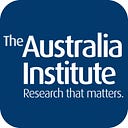Most Australians aren’t economists and neither are our politicians
Chief Economist Richard Denniss talks econobabble with Dr. Karl on his podcast Shirtloads of Science.
Most Australians are not economists and neither are our politicians. Despite this, public debate is saturated with econobabble — opaque economic terminology used deliberately to obscure what you think a word means.
Subsidies, markets, tax concessions and dividend imputation are all examples of the econobabble we hear everyday.
“99 percent of Australians aren’t economists and 99 percent of politicians aren’t economists.
“So whenever you hear a politician speaking to an audience in the language of economics, understand that they don’t speak it, they know you don’t speak it, so why are they using complicated jargon when they should just be talking to their constituents in plain English?” says Richard Denniss, Chief Economist at The Australia Institute.
“As 24 million citizens, we have to agree on what our priorities are, what do we want more of, what do we want less of. But instead of an honest democratic conversation that says: look, I’ve got a billion dollars, what do you think I should spend it on? They use econobabble: this jargon to conceal simple democratic choices from the public”
Here’s are example of what Denniss is talking about, from his book Econobabble:
“Markets reacted angrily today to news that the government is considering tightening fin capitalisation provisions”
Translation?
“Rich foreigners reacted angrily today at news they might have to pay tax on profits they earned in Australia”
This language is often applied to our most important and divisive political debate, distracting from facts and clouding the choices we are able to make.
“The idea that we would subsidise coal mines, for example, at exactly the time in world history that we are saying we want to reduce greenhouse gas emissions, from an economists point of view that’s bizarre” says Denniss,
“It’s like saying we want to tackle smoking by subsidising cigarettes. You can do it, it’s a democracy: we can do anything we want, but it’s a very strange economic choice to spend scarce tax payer dollars subsidising an activity that we are committed to reducing”
“If you want more coal mining, subsidise the mine. But why would we say we can afford to subsidise a coal mine but say we can’t afford to subsidise more public health or other important things that would deliver benefit, these are democratic choices” he said.
You can hear more about how econobabble affects public debate by listening to Episode 68: Understanding Econobbabble of Dr Karl’s Shirtloads of Science podcast.
